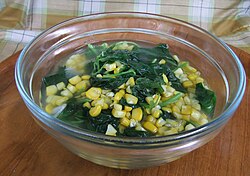This article needs additional citations for verification .(July 2020) |
 A bowl of sayur bayam | |
| Alternative names | Sayur bening, sayur bayam bening |
|---|---|
| Course | Main course (breakfast or lunch) |
| Place of origin | Indonesia |
| Region or state | Nationwide in Indonesia |
| Created by | Indonesians |
| Serving temperature | hot |
Sayur bayam or sayur bening is an Indonesian vegetable soup prepared from vegetables, primarily amaranth, in clear soup flavoured with temu kunci . It is commonly prepared as main course during breakfast or lunchtime.